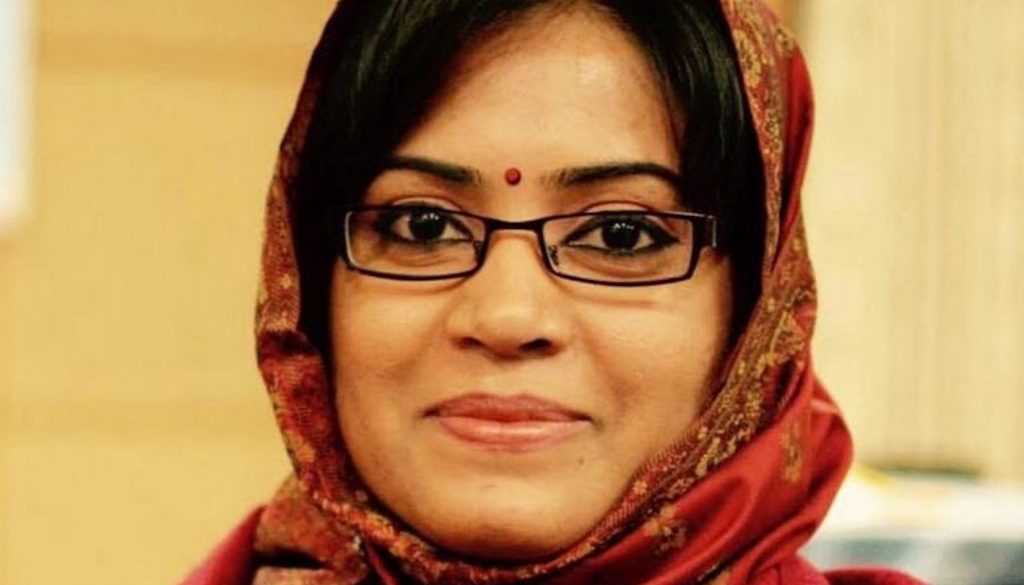An audience with Bachera Aktar, Emerging Voice for Global Health 2022
Leah Murphy with Bachera Aktar
Bachera Aktar, an ARISE researcher and Assistant Director of the Centre of Excellence for Gender, Sexual, and Reproductive Health and Rights at the James P Grant School of Public Health has recently been selected for the Emerging Voices for Global Health (EV4GH) programme, an innovative multi-partner blended training programme for young, promising, and emerging health policy and systems researchers, decision-makers and other health systems actors with an interest to become influential global health voices and/or local changemakers. The EV4GH programme is linked to the Global Symposium on Health Systems Research.
We’re really excited about this at ARISE, and we wanted to catch up with Bachera to find out a little bit more.
LM: Congratulations on this achievement Bachera. What is it that inspired you to apply for the Emerging Voices programme?
BA: Thanks, Leah. My motivation for applying to the EV4GH programme was driven by my keen interest in health systems research. And there are actually four key driving factors that inspired me to apply to this programme.
The first one is that as a public health researcher, I have always been interested in research that can contribute to strengthening health systems in low- and middle-income countries, including my own country, Bangladesh. And over the years of working in urban and health systems in Bangladesh, I have learned the complex contextual dynamics and challenges of health systems in those contexts, and have become more interested in urban health systems, especially when I started working with the ARISE project. That working experience has helped me to spatially to understand the context of pluralistic health systems like Bangladesh, where weak governance leads to the emergence of many parallel systems, with many sector stakeholders involved directly or indirectly, and many areas being unserved. So, I was looking for a way that I can, as a researcher, better contribute to my country. And then I found that the EV4GH programme is one of the nice programmes that can help me to further my understanding of different contexts and different complexities of health systems.
The second factor that drove me to apply for the EV4GH programme was my PhD. I’m also an international public health PhD student and my PhD research is focusing on urban health governance. I felt that being part of EV4GH with its training programme and its global network would be very helpful for me to deepen my knowledge, and to become a part of this global network. Participating in EV4GH will be helpful for me for my PhD research as well.
The third factor that inspired me to apply for this programme is that I’m also an academic – I teach a Master in Public Health programme in my institute – and I’m also curriculum developer. I felt that participating in the EV4GH programme would help me to improve the curriculum, my teaching, and my programme. Being part of the global EV4GH network will strengthen my course curriculum with recent global knowledge about health systems, and then I can transfer that knowledge to the new public health professionals.
And the final driving factor for me is that I envision developing myself as a global expert in Health System Research and my long-term goal is to continue my career in health system research and teaching. And I think that my experience in the EV4GH programme will add value in that aspect.
LM: That sounds amazing, Bachera. Sounds like is a very good fit! What opportunities does participating in the EV4GH programme offer you?
BA: Oh, I must say that the opportunity of being part of a huge global network of Emerging Voices – they are actually everywhere – and also the intense training programs. We are just about to finish the distance learning part of the EV4GH program. And that part was really amazing. I have learned different ways of disseminating, connecting with stakeholders, policymakers, disseminating research findings. The content that we were taught in the distance learning part of this programme helped me to think critically about myself as a researcher and also rethink my role as a public health researcher. It’s not just producing academic papers; we do have actually more responsibility to the countries that we are representing and for the people that we are working with. This programme has helped me to think differently about how I should, as a public health system researcher, disseminate my research findings, what different channels and methods I can adopt and apply to my research so that I can reach wider community wider audiences, not just the research community.
LM: It sounds like there’s a lot of opportunity there. What is it that you’re most hoping to get out of your time?
BA: As a part of this programme, we are introduced to many global health experts, and also the EV4GH network is a huge global network. I’m hoping to expand my global networks so that I can also be part of other professional networks, professional bodies that will help me to boost my professional career and expand my knowledge.
LM: What is it that you hope to do or achieve during your time as an emerging voice?
BA: As a part of EV4GH, we are supposed to produce some outputs. But my vision is a bit long-term. I’m thinking that the global network I will become part of will help me to build new research partnerships and do more research in different health systems areas.
—
Join us at the Seventh Global Symposium on Health Systems Research (HSR2022)
We’re delighted to join our colleagues at the Seventh Global Symposium on Health Systems Research (HSR2022) which will take place in Bogota, Colombia from October 31 – November 4, 2022, bringing together approximately 2,000 health systems researchers, policymakers and practitioners from around the world.
